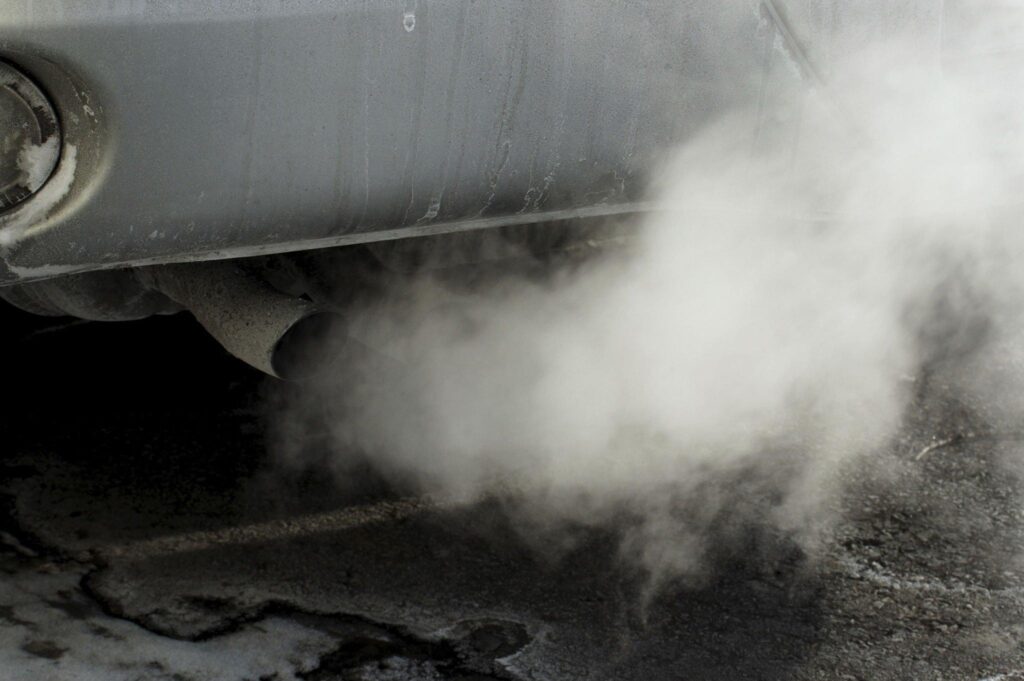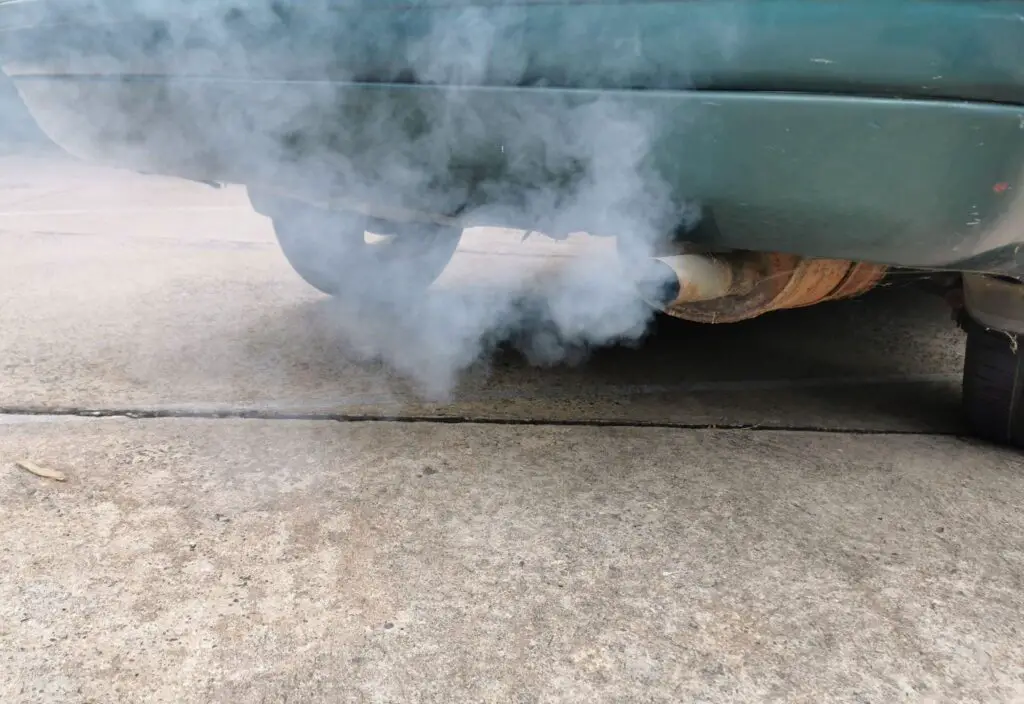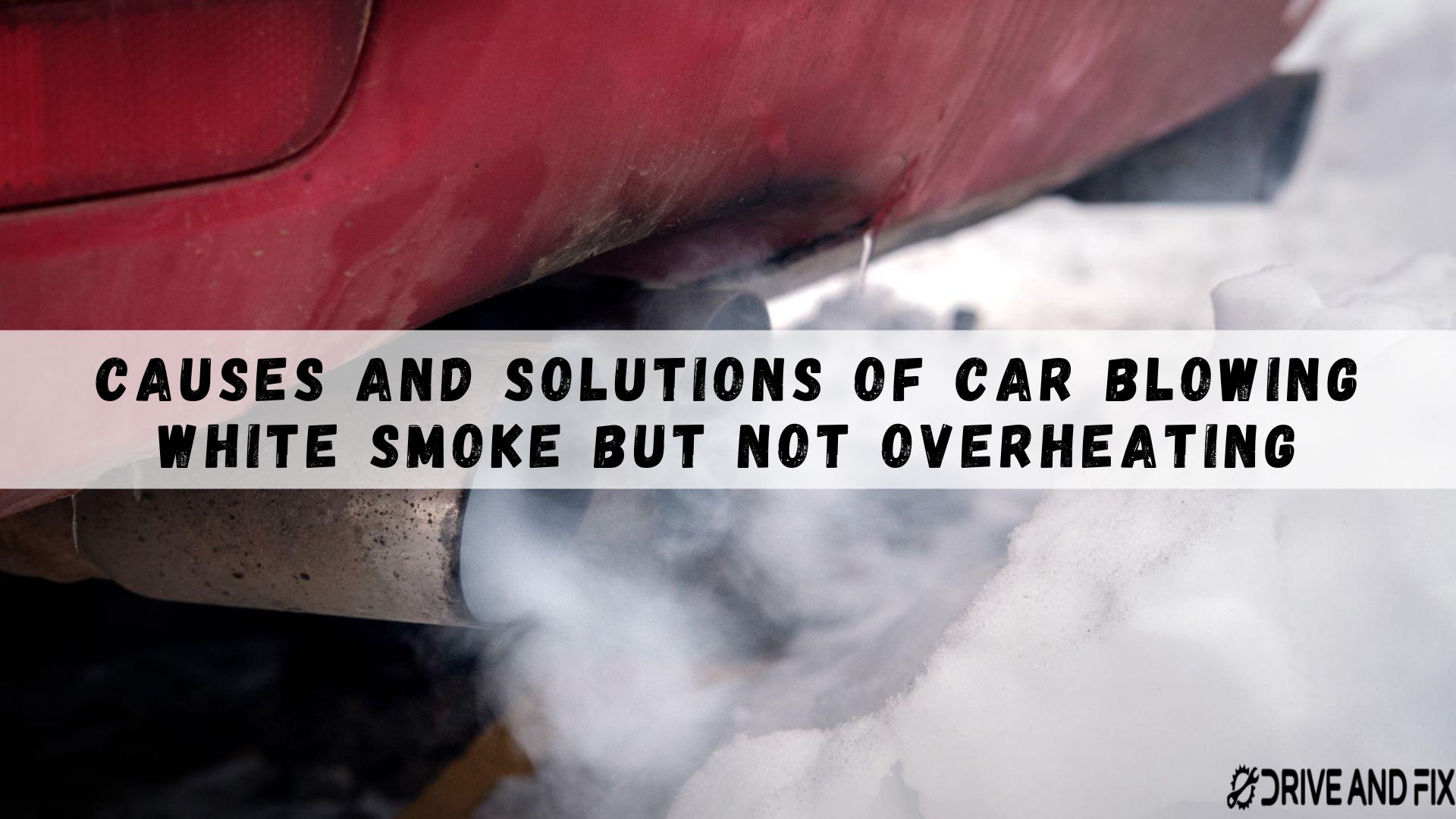White smoke coming from a car’s exhaust is a cause for concern and may indicate an issue with the engine. One possible scenario is when the car is blowing white smoke but not overheating. It can be a tricky problem to diagnose, since various issues may cause it.
This write-up is about some of the common causes of white smoke in this scenario, methods for diagnosis, and potential solutions. Let’s understand the possible causes and answers for this problem can help car owners and mechanics troubleshoot and repair the issue, ensuring the proper functioning and longevity of the vehicle.
Possible Causes Of Car Blowing White Smoke But Not Overheating

- Worn Engine Piston Rings
One possible cause of white smoke from a car’s exhaust when the engine is not overheating is worn engine piston rings. The piston rings are responsible for sealing the combustion chamber and preventing engine oil from entering the combustion chamber; when the rings become worn, it can cause oil to leak into the combustion chamber and burn along with the fuel, resulting in white smoke.
- Head Gasket Failure
Another common cause of white smoke is head gasket failure. The head gasket is the seal dividing the engine block and the cylinder head. Its function is to seal the combustion chamber and separate the engine oil and coolant. Once it fails, it could allow coolant to leak into the combustion chamber, causing white smoke to be emitted from the exhaust.
- Cylinder Head Crack
A cracked cylinder head or block is another cause; the engine overheats, and the cylinder head or block expands and cracks. This can cause coolant to leak into the combustion chamber and cause white smoke.
- Blown Turbo Charger
A blown turbocharger or intercooler can also be responsible for white smoke. When the turbocharger or intercooler leaks, oil can enter the intake system and be burned in the combustion chamber, resulting in white smoke.
- Valve Seals Leakage
Leaking valve seals can also cause white smoke, as they are designed to keep the engine oil out of the combustion chamber. When they wear out or become damaged, they can allow engine oil to leak into the combustion chamber and burn along with the fuel, resulting in white smoke.
- Coolant Leak
Lastly, a coolant leak into the combustion chamber can also cause white smoke. Coolant is designed to keep the engine from overheating, and when it leaks into the combustion chamber, it can burn along with the fuel, resulting in white smoke.
These are just some of the common causes of white smoke from the exhaust when the engine is not overheating. There could also be other causes, but it’s best to take the vehicle to a professional mechanic to diagnose the problem and recommend a solution.
Effects of Car Blowing White Smoke

If a car is blowing white smoke but not overheating, it can indicate a problem with the engine. Depending on the cause of the problem, the effects can vary. Some of the possible impacts of a car blowing white smoke but not overheating include:
- Reduced fuel efficiency: If the engine burns oil or coolant, it can decrease fuel efficiency as more fuel is needed to power the engine.
- Loss of power: If the engine is not functioning well, it can result in a loss of power and a reduction in overall performance.
- Increased emissions: Burning oil or coolant, can increase emissions, which can be harmful to the environment and illegal.
- Damage to the engine: If the problem is not addressed, it can cause further damage, leading to costly repairs or even engine failure.
- Reduced engine lifespan: It can shorten its lifespan, which may require costly replacements.
It’s advisable to address the problem as soon as possible to prevent further damage and improve the performance and longevity of the engine. Regular maintenance and inspections can aid in the prevention and detection of these issues.
Diagnosis
Diagnosing the problem of white smoke from the exhaust when the engine is not overheating can be tricky, but a few steps can be taken to narrow down the causes.
- Check Engine Oil Level
The very first thing you check is the engine oil level and condition. If the oil level is low or the oil appears to be milky or discolored, it could indicate that coolant is leaking into the engine, which could be a symptom of a head gasket failure.
- Visual Inspection
Visual inspection of the exhaust pipe for white smoke is another step. This will help confirm that white smoke is coming from the exhaust and provide clues as to the cause of the problem. For example, if the smoke is thick and white, it may be caused by coolant burning in the combustion chamber, while if the smoke is thin and white, it may be caused by oil burning in the combustion chamber.
- Run a compression Test
Running a compression test will also help identify problems with the engine. This test can help to determine if the engine has low compression, which worn or damaged piston rings or a cracked cylinder head or block might be causing issues.
- Check Turbocharger and Intercooler
Checking the turbocharger and intercooler for leaks can also be necessary, as a blown turbocharger or intercooler can cause white smoke to be emitted from the exhaust.
Multiple issues can cause white smoke from the exhaust. It’s best to take the vehicle to a professional mechanic who can diagnose thoroughly and recommend a solution.
Solutions
Depending on the cause, the problem of white smoke blowing from the exhaust when the engine is not overheating can have several solutions. These solutions include replacing worn engine piston rings, head gaskets, cracked cylinder heads or blocks, blown turbochargers or intercoolers, leaking valve seals, and repairing or replacing coolant system components. Repairing typically entails removing the engine from the vehicle and disassembling it in order to access the relevant parts and replace them with new ones.
We always recommend finding a professional mechanic to diagnose the problem and recommend the best solution.
Final Thoughts
Now you know why your car blowing white smoke but not overheating. You know the potential causes for this issue, including worn engine piston rings, head gasket failure, and more. To properly diagnose the problem, methods such as visual inspection, pressure testing, and compression testing can be utilized.
It’s important to address the issue as soon as possible to prevent further damage and improve engine performance and longevity. So don’t let a little white smoke get you down, with the proper knowledge and help of a qualified mechanic, you can get back your car on the road in no time.
You May Also Like:
- Passenger Seat Stuck In Recline – Causes, Troubleshooting, And Repairs
- Blown Fuse Car Won’t Start? Here’s What You Need to Know
- Why Car AC Stops Blowing Cold Air After A While -Troubleshooting Tips
- Why Brake and Battery Light On After Replacing Alternator?
- Why Is My Car Still Overheating After Replacing Thermostat And Water Pump?


